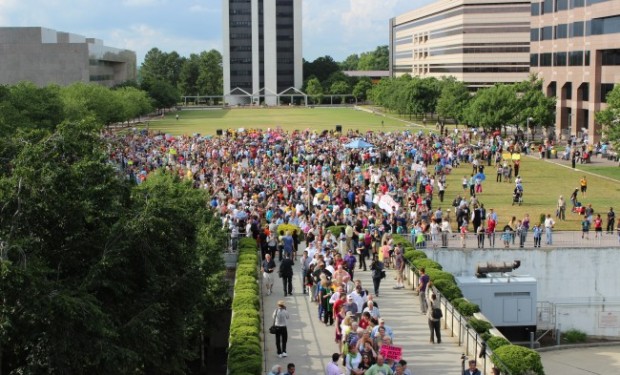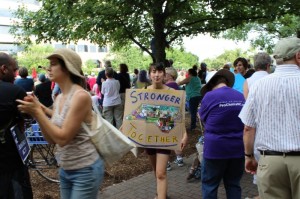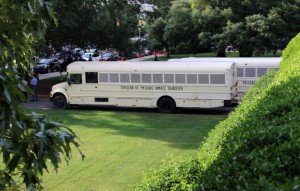Moral Monday: An arguable “W” for the State’s now infamous rallies
Despite the conclusion of the North Carolina General Assembly’s 2013 long session, Moral Monday organizers avow that they will continue to fight the recent overhaul in state legislation.
Moral Monday. People all across the nation have now heard of it. Those that live or work in downtown Raleigh may have even seen it. But the larger question many are left with is: what exactly is it?
“[T]hose who choose to petition the legislature through nonviolent civil disobedience, based on their own moral conscience.” This is how the Moral Monday movement advertises and describes itself on the website of its primary coordinator, the North Carolina chapter of the National Association for the Advancement of Colored People (NC NAACP).
Reverend Barber claims that “It isn’t about Republicans or Democrats, it’s about extremists attacking Democracy.”
The founder of the Moral Monday rallies, Reverend William Barber, II, declares that the participants of Moral Monday come from all points on the political spectrum. Reverend Barber claims that “[i]t isn’t about Republicans or Democrats, it’s about extremists attacking Democracy.”
While the group and its leaders may think of Moral Mondays as non-partisan, the majority of the media coverage, as well as the public’s concept of the movement, labels the demonstrators as Democratic. Senator Thom Goolsby (R-New Hanover), putting into words the sentiment held by those on the receiving side of the protests, described the participants of Moral Monday as those “that represent a far-left fringe.”
Regardless of their political tint, what started as a meager convention of protesters on April 29, 2013, grew to a crowd of nearly 10,000 participants by July 29, 2013, the final day of protests scheduled to take place in Raleigh.
“That’s the difference between movements and organizations.”
Reverend Barber, who also serves as the President of the NC NAACP, believes that the organization of the movement—or, the lack thereof—is partially to thank for the success of the demonstrations. He stresses that Moral Mondays are made up of an alliance of numerous groups, and that this grassroots structure will prove most effective in getting their voices heard. Forming an official organization would lead to arguments “over who’s going to be president and who’s going to be treasurer,” Barber avows. “That’s the difference between movements and organizations.”
The movement focuses its unbounded energy on issues such as proposed reform and budget cuts in the areas of healthcare, unemployment benefits, women’s rights, taxes, and voting rights. A Moral Monday Twitter account has multiple posts per day, updating followers on the progress of the group with photos of the demonstrations, op-ed articles from many notable local and national media sources, and up-to-the-minute information about developing legislation.
Senator Neal Hunt (R-Wake) acknowledges the plight of the protesters, even if he disagrees with them. “It’s basically a total difference in philosophy,” Hunt explains. “We think that free enterprise is the best way to go to make sure people have the motivation to do the best they can for themselves. The other side is government needs to do more and more.”
After thirteen weeks of protest and nearly 1,000 arrests, many are left wondering if the demonstrations had any political impact at all.
And with a heavy Republican seating in the current N.C. General Assembly, this “agree to disagree” stance appears to be as far as the legislature is willing to hedge. When legislators headed home at the close of this year’s session in late July of 2013, demonstrators followed suit, signaling the year’s final Moral Monday at the Capitol. After thirteen weeks of protest and nearly 1,000 arrests, many are left wondering if the demonstrations had any political impact at all. The answer—well, that would depend on who you ask.
Many of the issues targeted by the Moral Monday crowd have been decided as a matter of law, in the form of bills signed by the state’s governor, Pat McCrory. To the dismay of the protesters, the majority of these bills were settled in a manner that was opposite of what the group was hoping for. For instance, when hundreds of women formed the “front line” of the July 15 protest that concentrated on women’s rights, the crowd came away unsatisfied when sweeping restrictive abortion legislation was signed.
“You have a Republican majority that is doing exactly what they were elected to do.”
The legislative initiatives, according to Governor McCrory and other Republican leaders, is a “win” for the majority of North Carolina voters who made their voices heard in the 2012 election. North Carolina Republican Party leader Claude Pope said of the acts of the Legislature, “You have a Republican majority that is doing exactly what they were elected to do.” In fact, Governor McCrory has been able to accomplish “20 of the 22 objectives” that he set out in his State of the State speech in January of 2013.
In response to Moral Mondays, the State’s GOP leaders organized “Thankful Tuesday” to congratulate the legislators for standing firm in their policies. To this group of demonstrators, the N.C. General Assembly deserves thanks for doing its part to pull the state out of the debt and overregulated business that they feel was a consequence of decades of Democratic control in the legislature.
Just because the General Assembly has headed home for the year does not mean the protesters will do the same.
Regardless of the letdown that some of the Moral Monday protesters may have felt with each bill passed, Reverend Barber has stated that he knew there would be setbacks. “We may not sprint forward, but there’s a resistance to going backward,” he declared. The Moral Monday movement does not categorize the protests at this year’s legislative session as a failure, but instead highlights the progress made in terms of garnering national attention to the group’s mission.
Just because the General Assembly has headed home for the year does not mean the protesters will do the same. “We are not ending Moral Monday. We are suspending it [in Raleigh] and taking it on the road,” says Reverend Barber, with demonstrations held on August 5 in Asheville and planned for August 19 in Charlotte. To the supporters of Moral Monday, this year’s group of rallies were one for the books—they sparked an uprising and will trudge forward until their goals are completed.
Labeling Moral Mondays with a “W’ or “L” matters naught to those who gauge the impact of the protests sans political lens. Many North Carolina citizens are concerned with the practical and financial implications of Moral Mondays. Numerous groups have had to dole out resources, bring in supplemental employees, and strategize for each Moral Monday and the lasting effects it will have on the system. Thousands of taxpayer dollars have already been expended on meeting the needs of the Raleigh Police Department, the City-County Bureau of Identification, the Wake County Detention Center, and the Wake County Magistrate’s Office during the days of the protests. The demonstrations’ impact will also continue for many months into the future, as the Wake County District Attorney’s office, county courtroom personnel, and judges will need to deal with the skyrocketing caseload in the wake of the Mondays’ arrests.
The people who are getting punished are the citizens of Wake County.
“I don’t think the people who are doing this understand what they’re doing to the system,” Wake County District Attorney Colon Willoughby lamented. “[The protesters] are not punishing the General Assembly. The General Assembly is not hurting because of this. The people who are getting punished are the citizens of Wake County,” Willoughby said, referring to the taxpayers who will be funding the ramifications of the demonstrations.
The overtime demand on the criminal justice system, however, will not stop Reverend Barber and his Moral Monday followers, who consider heightened taxes a small price to pay for the political shift they hope to see in the long run. Whether you want to label Moral Mondays as a win, loss, or simply a money-pit, be reminded that we have not yet seen the end of the rallies. The words of Reverend Barber warn the citizens of North Carolina against jumping to conclusions: “Don’t make no mistake, North Carolina. This is no momentary hyperventilation, or momentary protest. This is a movement.”







